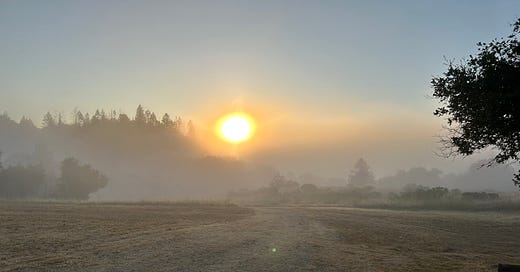What is Jewish Ecology?
How can we define a field which has yet to come into being? How can we bring ecology into dialogue with Jewish ideas and history while without losing touch with the rich diversity of Jewish Life?
“Judaism has a special essence: it is something that is laid down in square letters and something that illuminates living faces; it is both ancient doctrine and contemporary history… Judaism emerges, perhaps, more aware of what it has received, but less and less sure of its own truth"
- Emmanuel Levinas, Judaism, in Difficult Freedom, 1963
This article is going to be a bit different. While I want to continue on our journey through the foundational ideas of Jewish ecology, it is vital that we can stop, take a breath, and look out upon the vast landscape that I call Jewish Ecology.
Jewish Ecology is part of a broader movement within the field of ecology, a movement that seeks to bring a true integration to the whole of Science. One day, perhaps not too far in the distant future, the disciplinary borders that divide academia into a collection of disparate fields will begin to blur, ultimately weaving each individual branch, thread, and thinker into a common project. This unified project will integrate Science, Philosophy, and Religion, working to articulate the foundational relationship of human knowledge to the course of what we now call the “Anthropocene.” In telling working together to tell the many stories of that constitute our interconnected lives, this Science will be one path through which people of all ages, backgrounds, and lineages will participate in bring about The World to Come. A better world is possible, but only if we know how to do it together.
Within Judaism lies the understanding that each person has been formed in the image of G-d; with each of us bearing a spark of divinity within us. And at the same time, Judaism repeatedly declares the Oneness of G-d. Jews don’t see tension in these understandings. We are all truly part of the same Divinity, the same interconnected unfolding of Nature.
There are two distinct trends in Judaism regarding the nature of the Divine. Some see G-d as an otherworldly being, utterly transcendent, distant from the world. For Jews who hold fast to this notion of G-d, prayer, ritual, and observance of Law is the only way we can bring G-d’s presence into the world.
Others see G-d’s presence as itself One with the World. All beings being immanent manifestations of this Divine presence, this force of Life and Existence. Through our interconnectedness and interdependence, through ethical engagement with others —by being friendly, loving, caring; and working to find common ground in pursuit of Truth —we actively participate in bringing G-d more fully into the world.
These two notions of G-d are not necessarily at odds with one another — in each case, we see the essential aliveness, the loving reciprocity, and the act of community as holiness manifest in the world.
Within Jewish ecology, we will bring a deeper appreciation of the process of building an ethical relationship with and knowledge of the Living World. Weaving together questions of life — stretching the human niche in the environment to the Spirit of History — we will find paths that brings us face-to-face with the ethical demands of Life within Judaism. We will work together to seek out the deepest meanings of what it looks like to love our neighbors, to truly listen to one another, and to hold fast to the Oneness of Life.
I hope you join me on this journey.
Over the past week I have worked on making this blog more accessible for those of you who would like to engage with Jewish ecology at a deeper level as we continue. To that end, I have started a living list of various sources that have inspired many of the ideas for Jewish Ecology. You can find them on my “About” page here.




I love this approach to bring about tikun olam - thank you, Jordan. Beautifully said. I also loved your Shabbat post.